Time Dilation in Tel Aviv.
None of the following events should have happened, by rights. I should never have even made it to Tel Aviv, but for some vestige of Baptist Guilt.
Why, I’ve Got Friends I Haven’t Even Used Yet
I currently have nearly 250 unanswered emails in my In-Box. Some are links and bulletins concerning cool bits of science I haven’t got around to reading but I will someday I swear I will. Others are personal missives from friends trying to arrange a get-together over the holidays, or pleas from Ekos to fill out an online survey concerning Canadian Attitudes to the Theological Implications of Quahog Reproductive Strategies.
Many are fan emails. Some are just bits of generic praise or condemnation, which I can answer in a sentence or two. Others contain links or essays, and even the sane ones tend to languish because I can’t really answer those until I’ve read an associated 15,000 words of science or political opinion. Some ask for advice on matters personal and professional, which more often than not I’m incompetent to answer.
I try, though. Even though I frequently resent the implicit demands on my time; I don’t know these people, after all, and it sometimes takes hours to craft an appropriate response. Don’t they know I have over 200 fucking emails in my In-Box? Don’t they know I’m struggling to meet the deadlines I’ve already got?
But I try. Because a lot of the mail is heartfelt, and the mere fact I’ve received it in the first place means that these people have some kind of faith (or at least hope) that I have useful insights to offer. I try, not because I think they’re right, but because I don’t want to look like an asshole. Because I don’t want to let someone down after they’ve reached out to me. Because, although I’ve long-since renounced my Baptist upbringing, the programming remains burned into the firmware: If you’ve done this to the least of my brethren, so also have you done it unto me.
So when someone wrote me in 2012, sharing their uncertainty as to whether they should pursue a career in science or art, I saw a younger version of myself and shared what I could. When someone else asked my opinion on their premise for a video game, I gave it— even though my own experience told me they’d never get the fucking thing off the ground, because that industry is way too conservative to risk a triple-A budget on anything that gives off the slightest whiff of originality. In both cases my response prompted others, a correspondence that eventually petered out, as such things do. I went on to feeling guilty about other emails I hadn’t answered.
Sometime in the intervening years one of those guys got involved with the Utopia Film Festival in Tel Aviv. The other left his gig at Ubisoft, came home to Israel, and booted up his own studio with a handful of friends. Out of the blue, I’m invited to Tel Aviv. Out of the blue, I’m invited to tour this startup across town.
Out of the blue, I get a chance to meet cool people, learn new things and unlearn others, visit an ancient and achingly-beautiful part of the world I never thought I’d get to. I feel like the guy who gave a lift to the ragged stranger hitchhiking at the side of the road, only to find out five years later he’d helped out Howard Hughes.
This happens more often than you might think. It’s a whole new, purely Darwinian reason to not blow off your fans when they take the time to write to you. But I don’t think the effort:payoff ratio has ever been so high as it was in this city that literally took its name from a Utopian novel.
Future History
We fly in via Warsaw, under cover of night. Tel Aviv looks positively synaptic. Adam and Eden meet us at the airport and we mutually rejoice over the latest findings of corruption leveled at Netanyahu and his wife. They drive us to a funky little boutique hotel with an art gallery for a lobby, a rooftop garden that supplies produce to their restaurant, and complimentary welcome cocktails that we can take up to our suite.
We’ve been up for thirty hours or more. We crash.
Next morning we go down to the restaurant, expecting the usual self-serve table of buns and scrambled eggs and cold cuts simmering endlessly under heat lamps next to an empty coffee machine. We get table service and a menu fit for someone in training for a half-marathon. We meet the first of countless Tel Avivian cats, a ginger stray waiting patiently for his morning feed out on the patio. He has a nicked ear: a tag to mark him as an alumnus of the local neuter/release program. (Tel Avivians love their cats; every day as the markets close, shopkeepers put out their leftovers in little piles for the feline hordes. Already I want to move here.)
We have all day to explore before my first event: we wander the streets of Jaffa, an ancient seaport which has apparently been occupied for the past 9500 years (putting it disturbingly close to the end of the last Ice Age). These days it’s home to levitating peach trees and giant anthropomorphized egg plants (the plaque tags it as the whale that ate Jonah— I’m pretty sure the dude was escaping to Tarsus when Yahweh caught up with him, though, and speaking as a former marine mammalogist this statue doesn’t look anything like any whale I’ve ever seen). There are beggars. There are massive rococo fountains. There are mosques and churches and synagogues. Fortunately there are also a million cats. There is wifi.


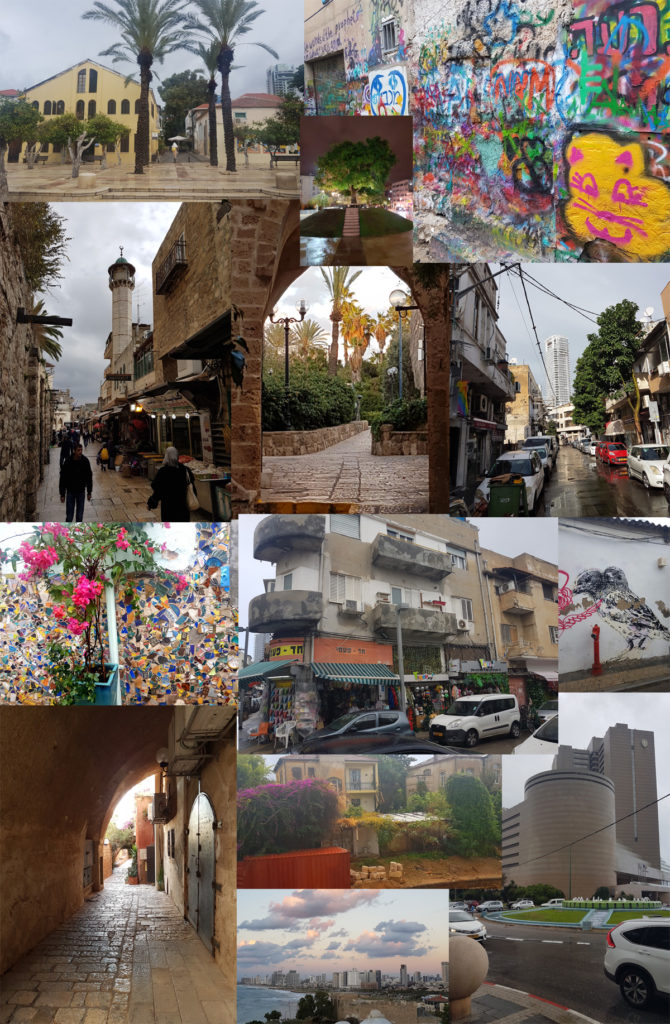
I’m slotted for an underground Q&A, in a museum-cum-archaeological dig. I cringe as it approaches: I’m no kind of name in Israel. I’ve had one novel and one novelette translated into Hebrew and both of those went out of print years ago. I figure I’ll be damned lucky if four people show up, but when four people do show up I heave no great sigh of relief. Fortunately people keep trickling in throughout the hour; by the time we hit the halfway mark there must be 20, 25 people in the audience. It’s not Poland, but it’s way better than I was expecting.
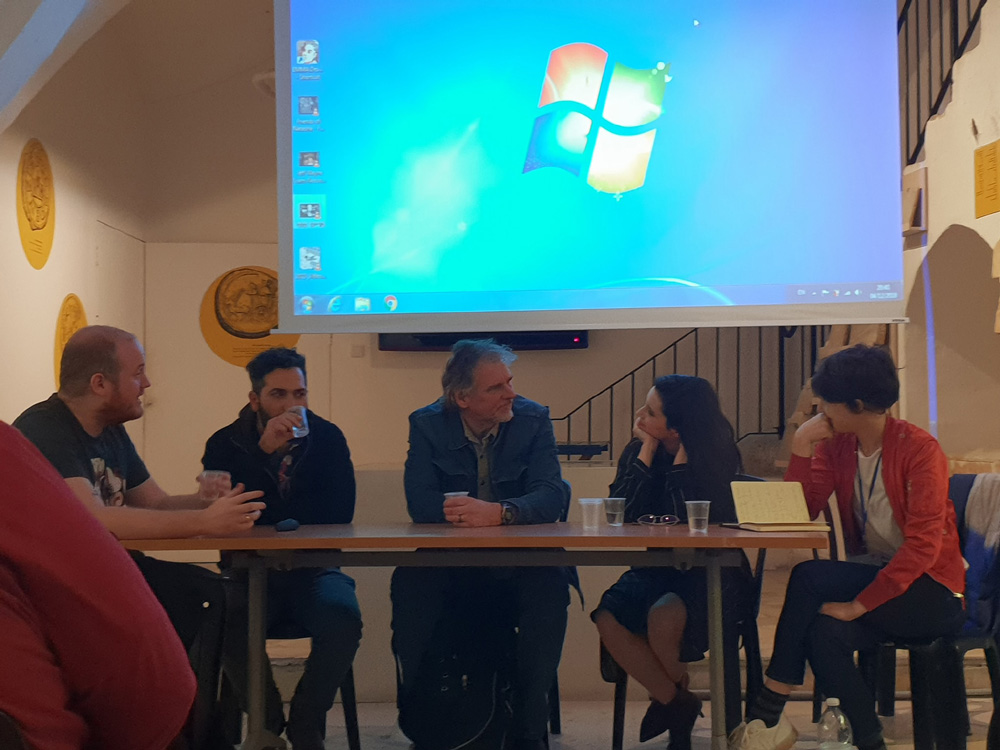
The next event is a panel on the general subject of how we use our art to describe the future. I share the stage with Mushon Zer-Aviv, a dude who’s developed a form of future-prototyping called Speculative Tourism; Aya Korem, an Israeli singer/songwriter who’s here thanks to her latest SF concept album and its accompanying graphic novel; and Katharina Dermühl, who cofounded an organization to work with refugees and asylum-seekers. Eden moderates; the panel rocks. But all the way through, I’m vaguely miffed because there’s this VR demonstration going on elsewhere in the festival, and I’m missing it.
It turns out okay, though. In fact, the whole VR thing turns out better than I could have ever imagined.
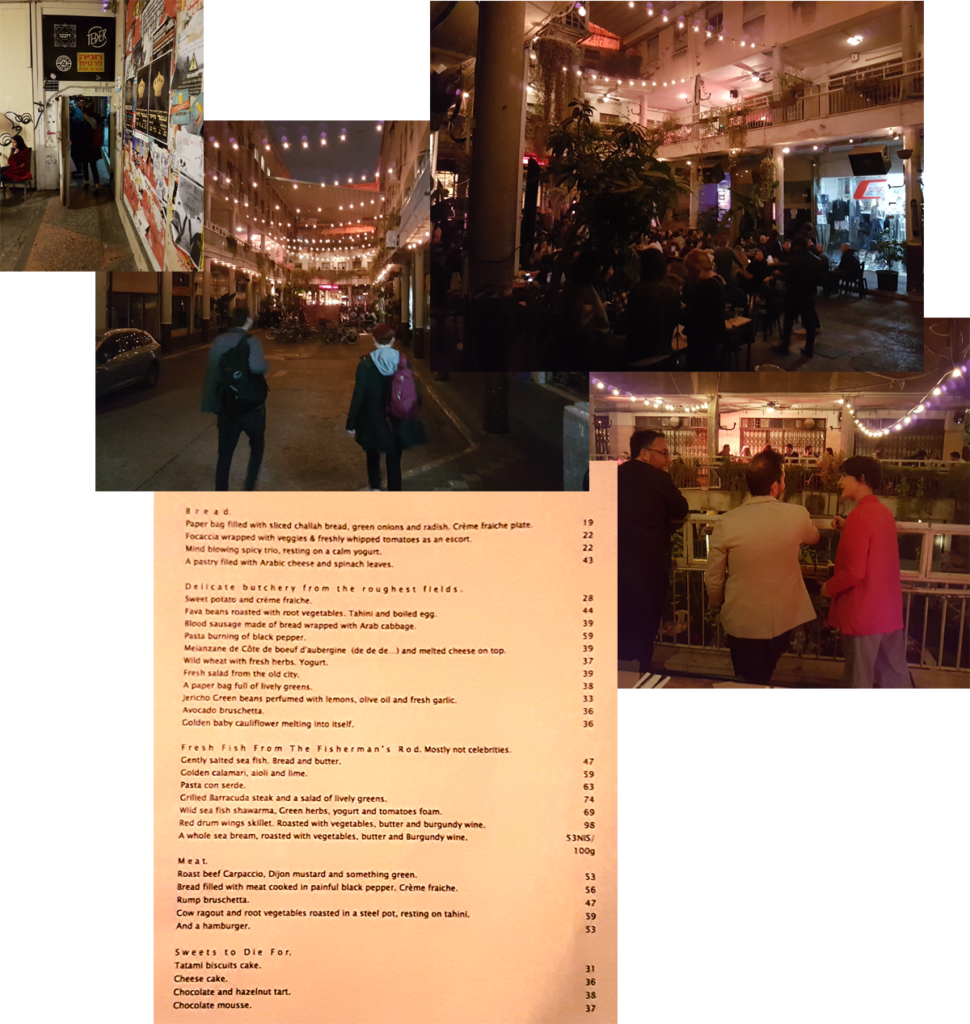
It’s common knowledge that everyone here has military training; being in the army is just a part of growing up in Israel. And yet, I’m continually surprised by that renewed realization, almost every time I meet someone. It doesn’t matter whether I’m meeting a teacher, or a filmmaker, or a musician; every hand I shake is attached to an artillery operator, or a tank instructor, or a combat specialist. Every gentle film buff I meet can probably strip down an automatic weapon and put it back together again blindfolded. They all probably know about eight different ways to kill me barehanded.
It’s a good thing they seem to like me.
On the Rubbing of Elbows
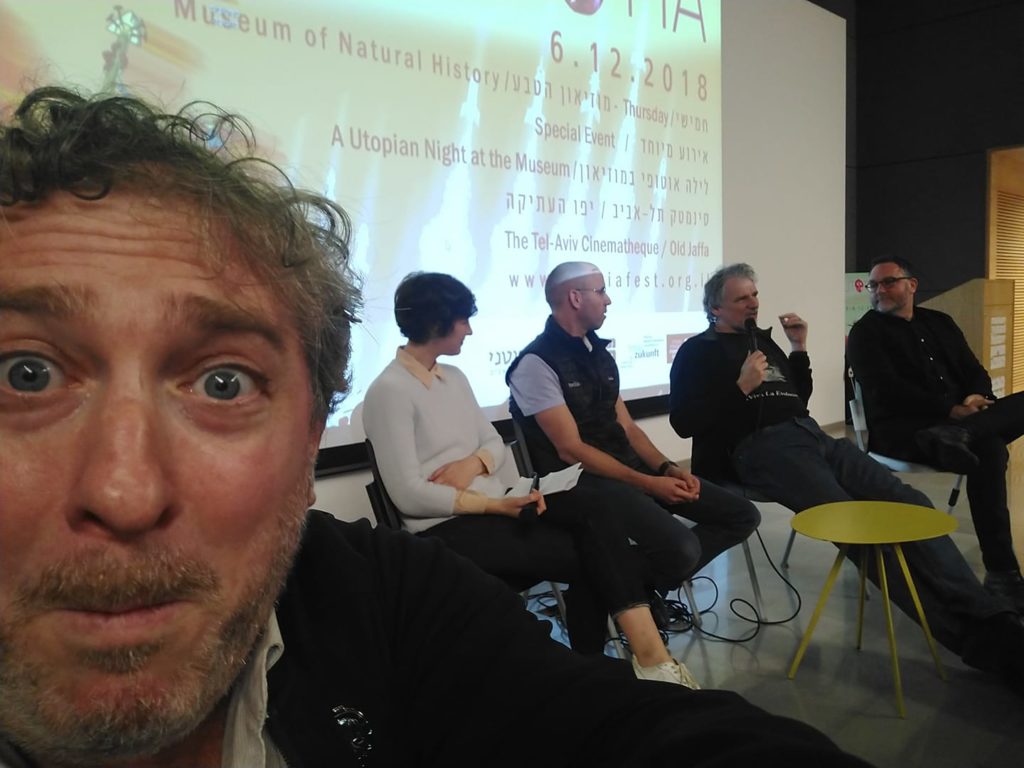
Mainly a film festival, right? By rights a written-word guy like me shouldn’t even be here. But here I am anyway, sitting on a panel leading into a special screening of Jurassic World: Fallen Kingdom, with biotech entrepreneur Omri Amirav-Drori to my right and Colin Trevorrow, director of the Jurassic World movies, to my left. We’ve convened to explore ways in which biology might offer some hope for the future. This is all going down in the newly-opened Tel Aviv Museum of Natural History, down the stairs from an infographic that increments, in real time, the estimated number of species that have gone extinct just this year. It’s already on the high side of 120,000; this, among other things, leaves me a bit dubious of Omri’s free-market exhortations about extinction rates (“You talk about species going extinct, we can create new species!”).
Maybe a bit too much of the panel consists of me and Omri arguing about capitalism and apocalypse, but Colin seems amused by the whole thing. Describes me as the incarnation of Ian Malcolm. He says this a couple of times over the course of the evening, and I smile and nod and feel like an ignorant doofus because while the name sounds awfully familiar, I can’t remember who Ian Malcolm actually is. I envision some present-day incarnation of Rachel Carson or Sylvia Earle; I feel profoundly inadequate that someone with my scientific background could have forgotten a person of such stature. It isn’t until the next day I remember that Ian Malcolm was just the Park-bashing mathematician in the original Jurassic Park.
My inadvertent channeling of Crichton’s character pays off big-time, though. Colin thinks enough of the exchange to invite Omri and me into the fold for a couple of hours of consulting, which basically consists of getting paid to sit around opining about Jurassic movies both past and upcoming (no details; the NDAs involved are almost as arcane as those you’d find in the video game industry). Omri, en route to Senegal the moment the panel ends, can’t make it; so I end up jamming with cybersecurity specialist Keren Elazari instead.
This sort of thing happens all week. Hiding behind the BUG during some shindig at the Spanish Ambassador’s residence, we run into a guy wearing a Westworld Maze t-shirt— turns out he directed a movie that some Netflix algorithm keeps haranguing me to watch. (“The Similars”— also “The Incident”, which I also haven’t seen. They’re both on the list now.) I show up for my “Storytelling the Future” panel and discover the person I’m sitting next to is an activist pop star who not only took her record label all the way to Israel’s Supreme Court— and won—but also pioneered federal legislation to protect the rights of artists against predatory record companies. (My only regret of the whole week was that we never found the time to take Aya and her partner up on their offer of beers.) Even the mandatory lunch with a Festival sponsor got me a free t-shirt and an argument about consciousness and determinism. (“Are you for the revolution, or against it?” Yanki Margalit wants to know when we first meet. I hedge: that really kind of depends on what we’re revolting against. “Violence against women!” he pronounces. Which seems to me like way too self-evident a thing to require an outright revolt; surely the vast majority of people are already against that, right? It would be kind of like staging a revolution against genocide, or environmental destr— ohhhhhhh…)
He never even mentions his private space program.
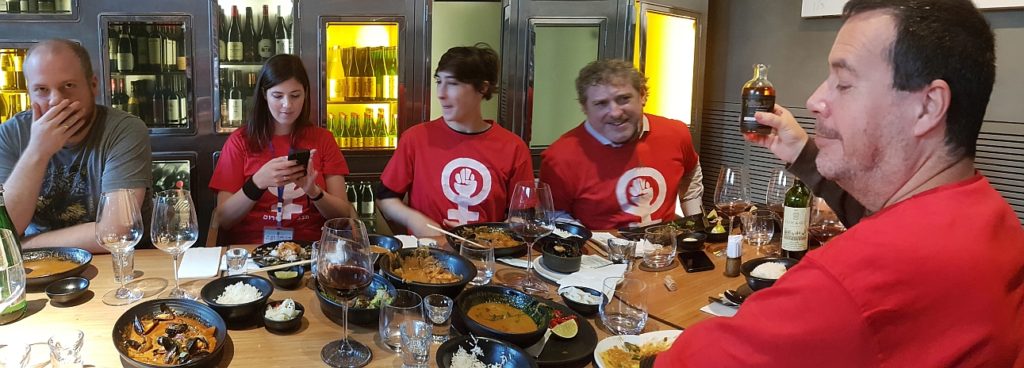
A Debt to Incompetence
A quick digression back to the Tel Aviv Museum of Natural History for a moment: state of the art, brand spanking new, home to everything from dinosaur bones to Brazilian Hissing Cockroaches.
Also to one of the most embarrassing yet vital naturalist legacies you might imagine.
Father Ernst Schmitz was a priest and amateur naturalist, active in the late eighteen/early nineteen hundreds. He was perhaps the only person with a deep and devoted interest to Middle-East fauna at that time, and he scrupulously collected and stuffed specimens of everything he could get his hands on.
Unfortunately, passion does not necessarily map onto skill. This dude’s taxidermy chops were terrible, which is odd given how much he practiced. I mean, just look at these lifelike poses:

Not that this has anything to do with the festival, mind you. I just think it’s heartening to know that no matter how bad you are at something, you can still achieve a measure of immortality just so long as no one else occupies the same niche.
The Stuff of Which Reality Is Made
I’ve never been to CERN. It’s on my bucket list.
I’ve hung out with a piece of the Large Hadron Collider, though. It’s lying around in Adam’s dad’s basement. Or at least, the basement of his lab. As chance would have it, Erez Etzion is the Chair of Particle Physics at Tel Aviv University and a CERN physicist, and— despite my repeated insistence that I don’t know nearly enough about that stuff to even ask a competent question— he opens a couple of hours in his schedule.
I get a quick yet fascinating tutorial in subatomic physics (I get to ask him about the “Fat Universe” model, although I remain unclear on quark flavors) before we head downstairs into the basement. The door to the lab is counterweighted with a soda can filled with some unidentified fluid. I’m not sure whether it’s a booby trap or just some kind of arcane latching mechanism; either option seems disappointingly Newtonian.
Inside, though, are CERN shells.
Think of CERN’s ATLAS assembly and you’re most likely to envision something that looks like God’s Own Spark Plug, fifty meters long, threaded onto a particle-accelerating torus almost 30km across (turns out there are a few smaller torii linked in as well, but let’s not make this more complicated than it has to be). All the particle-smashing, black-hole-creating, potential-universe-destroying stuff happens in the heart of that plug; but the particles created thereby fly off every which way, proliferating and speciating and decaying at a range of distances from the initial collisions. So ATLAS is sheathed in a concentric series of detectors packed with mixtures of exotic gas, or steel, or lead, depending on what kind of particle each is trying to stop.
I’m a bit too intimidated/uneducated/starstruck to be sure in hindsight, but I’m pretty sure that the slabs Prof. Etzion keeps in his basement are muon detectors, designed right here on campus. They look entirely unremarkable; they wouldn’t look out of place next to a motorbike and stacks of old porn in a Scarborough garage. (I’d imagined clean rooms and hepafilters and hazmat suits.) Think of them as space-shuttle reentry tiles; unremarkable in isolation, but absolutely mission-critical when linked together by the thousands.
Prof. Etzion is primarily a Standard-Model man, but he’s not above slumming it with off-the shelf components. He builds cosmic-ray detectors out of repurposed Plasma TV screens, for example. I want to poke around, see if I can maybe dig up a flux capacitor, but we have a panel over at the Natural History Museum.
The Rapture
The first time I experienced VR was in the nineteen nineties. You’d put a small bathtub on your head and find yourself in a wireframe environment populated by geometric solids and fellow players rendered as polygonal, roughly-humanoid shapes who jerked and flickered whenever you moved your head. You would shoot pixels at each other.
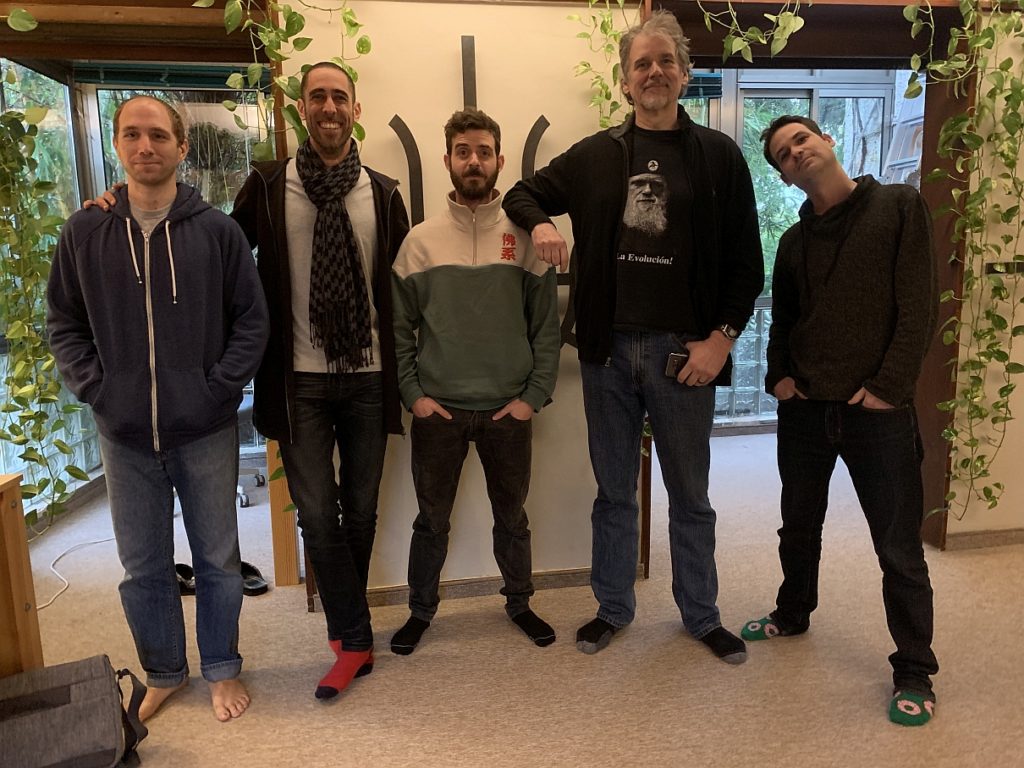
The second time I experience VR is in 2018, in the offices of an Israeli start-up called One Hamsa. They are fans, apparently; I exchanged some emails with one of the cofounders back when he was working at Ubisoft. They’ve spent a couple of hours watching me eat mixed nuts, then reluctantly eating some themselves when I wondered out loud why nobody else was eating these nuts and what they knew that I didn’t. We’ve discovered a lot of common ground (not the least of which is an enduring love for “Star Control 2”, a nineties-era videogame involving— amongst other things— screenplay-writing pterodactyls, blobular aliens whose idea of a practical joke is to instigate religious wars among other species, and a hypercapitalist civilization that literally throws its crewmembers into the fuel converters for an extra boost during space combat). One Hamsa has exactly one game on the market: a kind of space racketball arcade game called Racket: Nx. Big whoop, think I as I adjust the visor across my eyes. You want to impress me with VR? Gimme Skyrim. Gimme Bioshock. Gimme—
And then they boot it up, and I am Born Again.
I am standing on a circular platform, Earth hanging off my left shoulder. Stars everywhere. Diaphanous nebulae. I turn my head as fast as I can without giving myself whiplash: no frame drop. No response lag. No screen-door effect. I am there, I am standing in Outer Space and it goes on forever in every direction.
After a while I remember to breathe.
I barely scratch the surface of the game itself; I’ve received no instruction, I don’t know anything about the tractor-beam option or the strategic order in which one is supposed to pick targets. All I know is my right hand is a massive paddle that looks like a cross between a radio telescope and a waffle iron; I am in the center of a spherical arena build of interlocking hexagons; and the Devil’s own Rollerball is shooting toward me, streaming fire in its wake. I swing wildly, connect; it ricochets off hexagons, transforming and replicating and shattering them on impact, comes back at me from behind. I fend it off again. Somehow I’m racking up a score.
There’s a strategy element to all this, and a multiplayer mode but I don’t know about that: I’m just smashing things. Eventually I smash enough of them and the arena shatters like a mirror— drops away in hexagonal fragments and I am standing on the surface of the fucking sun. The photosphere boils beneath my feet, a vast seething expanse of convection cells; solar prominences arc overhead. The feeling borders on religious awe. I have just spent maybe five minutes at Level 1, set (I can only assume) to Dead Easy mode.
By the time I take off the gear I am a convert. No wonder this thing pulls down a 98% on Steam. No wonder those tech-companies-whose-names-I-forget chose this game to showcase their new audio warez. We have talked, One Hamsa and I, about the possibility of collaboration on their current project— a game with significantly deeper themes than Space Racketball— and I would be utterly on board for such a partnership. But whether that happens or not, I cannot wait to get home and research VR systems. I cannot wait to wait for Boxing Day when the prices go down, so I can spend the money Colin Trevorrow paid me. I cannot wait to convert the Trombonarium into a gamespace, to move the dining-room table and chairs and bookshelves and plants off into the kitchen or someplace to make room for my own alternate universe. Whether I get to claim it all as a business expense almost seems beside the point. I would buy all this stuff, and wreak such havoc on our home and marriage, just for this one game.
When I find out that Skyrim is available in VR, I don’t stop jizzing for an hour and a half.
A Place Where Even Artists Do Not Go
The city had been called Tel Aviv. Central Station rose high into the atmosphere in the south of the city, bordered in by the webwork of silenced old highways. The station’s roof rose too high to see, serving the stratospheric vehicles and rose from and landed on its machine-smooth surface. elevators like bullets shot up and down the station and, down below, in the fierce Mediterranean sun, around the space port a bustling market heaved with commerce, visitors and residents, and the usual assortment of pickpockets and identity thieves.
—Lavie Tidhar, Central Station
Central Station exists, as it turns out. Lavie Tidhar just slapped a spaceport on top. In real life it was supposed to be the central transportation hub for all of Israel, a hive not only of transport but of commerce. The bus station part, grafted onto a pre-existing train station, took decades to complete— including years spent derelict and incomplete when the money ran out.
Given Tidhar’s description, I’ve been expecting a bustling market heaving with commerce— and there is in fact a chaotic and tawdry sort of strip mall crowding a couple of ground-level floors between the actual bus platforms and the Lower Reaches. There are religious outposts— we found a synagogue near the top of the Inhabited Levels and a derelict Christian doorway down in the Forbidden Zone— but the religious iconography that most obviously rules over the Inhabited Levels are the Golden Arches.
It’s not much of a Kingdom, though. Almost three quarters of this monstrous edifice are deserted.
The actual bus bays occupy the uppermost levels, in an area festooned with all manner of graffiti. (Entry into the bays is an unexpectedly one-way affair: you push the door outward onto the platform, and only when it swings closed behind you do you realize that there are no knobs on the outside. There’s no way back in unless some kind or careless soul opens it again from inside and allows you to sneak past.) Even these occupied zones have an air of dereliction about them— water puddles on the floor, stray cats haunt the corners— but at least there’s a semi-bustling human presence. The further down you go, though— beneath the strip-mall chaos near ground level— the more deserted the place becomes. One retail outlet shines forlornly from a rank of abandoned neighbors. One fluorescent tube that works flickers alongside five that don’t. Every now and then, down some abandoned wing, a double-bolted door is festooned with intricate carvings and symbols.
We find a box office for a cineplex, but no actual cinemas to go with it. We find social amphitheatres that look like they were designed by the guys who did the sets for Space:1999; the chairs there look like they’ve never known a human ass. Apparently people hold raves down here (we see none), and phantom druggies haunt the levels to shoot up (we see one). Most startling and creepy and compelling are the “squatter art installations”, courtesy of anonymous artistes who have occupied abandoned storefronts and filled them with bright nightmare visions: giant crocheted eyeballs dangling from ligament and artery; balaclava’d child-angels playing with giant bloodworms; decapitated baby heads on poles.
We keep going down. We descend into, as Adam puts it, “the places even artists do not go”, places even he hasn’t gone, where the walls are bare concrete and the few lights that work glow dimly behind a generation’s accumulation of spiderwebs. We find a bomb shelter. We find a colony of bats, easily ten times the size of the pissant bats we have in Canada: these have bodies big as fat pigeons. We find a locked door with the bolts rusted shut, in an alcove where the concrete itself is crumbling to ruin; and a strange hoop-shaped antennae mounted on the wall beside, as if any EM radiation could ever make it this deep.
Halfway to the Earth’s mantle, we find a gender-neutral urinal.
Longer Lines than Disneyland
I missed the official tour of Old Jerusalem because it was booked across from my appointment with Prof. Etzion. So Adam drives the BUG and me there the next day, gives us our own personalized walkthrough. We visit the Wailing Wall and get into a small amount of trouble from a very pleasant dude hailing from Cleveland, who tells us we’re not supposed to take pictures of the Wall on religious holidays. (We get off easy; apparently there are parts of Jerusalem dominated by Orthodox gangs who throw rocks at women unwise enough to pass through their turf wearing pants.) We shop down cramped alleyways lined by little stalls hawking ancient traditional wares by Hugo Boss and Tommy Hilfiger. We watch Adam buy and consume an authentic Jewish bagel the approximate size and shape of a 400m running track. We hike along cat-haunted rooftops while Jewish and Muslim criers call their respective flocks to worship—
—it’s haunting and discordant and I can’t help but be reminded of bullfrogs calling in a spring pond, competing for mates. We spy a Christian VR Experience stall— locked up, from what I can tell— nestled below ground level between excavated columns of Roman architecture. We pass through an incongruously-modest little archway and find ourselves in the Church of the Holy Sepulchre: a kind of Christian Theme Park which claims to contain the site of the Crucifixion, the morgue slab where Jesus was embalmed/”prepared” (depending on your interpretation), and the tomb in which his body was buried, only to be stolen by grave robbers in the hopes it might have magical properties.

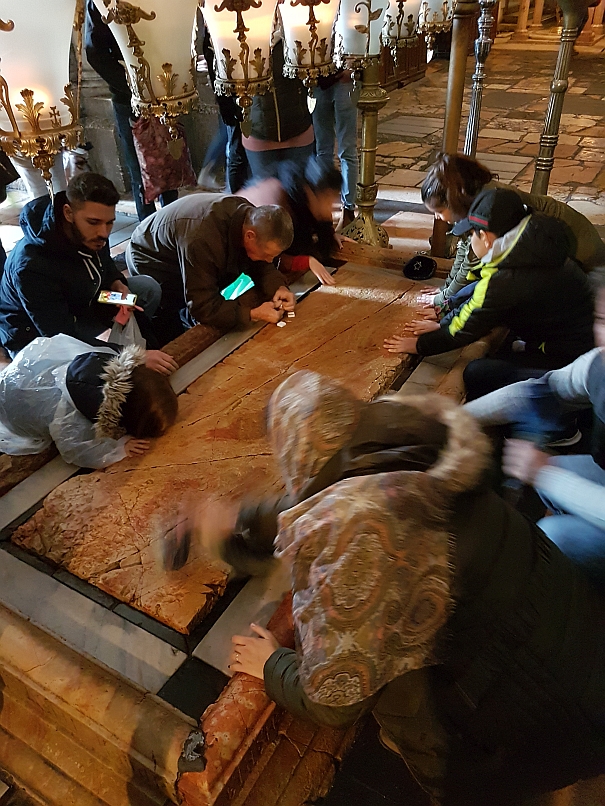
Nobody seems to find it odd that all these sites are so conveniently close to each other— each basically an amusement-park lineup away from the others. In fact, the authenticity of the morgue slab is so thoroughly embraced by those in attendance that many of them prostrate themselves against it, speaking in tongues. Others mop at the slab with cloths, as if to wipe up some bit of divine Christly essence that might yet persist after two thousand years. I see one man collecting samples into a series of tiny white plastic sample containers, for all the world like those I used to embed decalcified bone fragments in wax for microtoming back in grad school. Perhaps he’s hoping to clone the Son of God back from residual flakes of epithelium. I wonder if he’ll be disappointed when all he reconstructs is a clone of one of the myriad believers who drooled and sweated on this totem earlier the same day.
Islam’s Dome of the Rock shines like a beacon over on the far side of the Wailing Wall, but we don’t visit. The BUG and I would have no issues getting over there; Adam, a Jew, might run into trouble.
Which brings us, I guess, to
The Elephant on the Blog.
Ask your host if he can arrange passage for you into the West Bank, droid said at one point. See what happens. It’s the kind of challenge you take half-seriously at best— go to Canada’s Travel Advisory web pages and try to find a border with Israel that doesn’t come equipped with huge red exclamation points and DO NOT TRAVEL warnings in big red letters— but I ask anyway, while we spelunk Central Station. I also ask about Gaza, given what I’ve heard about the wall turrets there.[1]
“We could go,” Adam says after a moment. “It would feel intrusive, exploiting my status as an Israeli to go uninvited, basically to gawk, into areas where people don’t have nearly as much freedom to move. But I could reach out to my Palestinian friends, see if we could set something up.”
To any who might be reaching out to tick off the Some of my best friends are square on an Ideological Bingo card: Adam met these particular Palestinian friends through his mother’s work in an Israeli/Palestinian alliance called Road to Recovery. They carpool sick and injured Palestinians (mainly kids) past Israeli bottlenecks so they can get medical care unavailable in the occupied territories, so they don’t die waiting to get through a checkpoint. I doubt that any of the people Adam calls friend are token; I haven’t know the man for long, but I’ve rarely met anyone so thoughtful.
In fact, if anything, he bends over almost too far backward for balance. He prefaces his answer to pretty much every hot-button question with “Obviously this is just my interpretation”. He’ll channel the enemy, relate their accusations of injustice and atrocity past and present, admit: “— and they’re not wrong”, before going on to explain how much wrong there is to go around on all sides. I don’t know if I’ve ever met anyone who so scrupulously recognizes their own biases and gives so much credit to their opposition. All in a context almost guaranteed to raise Us-vs.-Them thinking to steroid-infused hyperOlympian levels.
We spend a fair amount of time with Adam and his friend Eden, talking over hole-in-the-wall hummus or sipping hipster drinks that seem to contain fetus skulls at the bottom of the glass. I’m not stupid enough to claim that I’m anywhere near to understanding the cesspit of conflicting agendas that have plagued this part of the world for so many centuries, but I think I’ve learned a little more about certain bits and pieces. (The Right of Return, to cite just one case-in-point. Maybe you’ve seen demonstrations of displaced Palestinians, waving the keys they’ve kept to family homes from which they were banished to make way for Israeli occupiers. They’re not wrong. Another not-wrong way of looking at it is that some of them left in the first place on the advice of Arab armies in surrounding countries, who told them they should leave for their own safety but that they’d be able to move right back in again just as soon as those armies had killed off all the Jews. You can see how certain Jews, yet unkilled, might be less than sympathetic to subsequent claims that Hey, we had a deal! Turns out even war crimes can have nuance.)
Adam was the man who invited us to Israel; he’s the guy who showed us around Jerusalem, and hung out with us, and talked to us the most. He met us at the airport, and, ten minutes after shaking hands, stated outright that the treatment of Palestinians was “basically apartheid” (contradicting any number of extranational voices who’ve insisted that comparisons to apartheid are off base). But he’s hardly unique in Tel Aviv; literally everyone we spoke to about the subject was adamantly opposed to the Israeli occupation.
These are the people we’re supposed to boycott? People like Uri, who tells me “I don’t consider myself an Israeli. I consider myself a Tel Avivian.” People like Eden, who matter-of-factly excoriates the Israeli government for its treatment of the Palestinians? Like Katharina from Berlin, who has dedicated her life to working with refugees and sees no dissonance in being here? Like Adam, called a traitor by his own countrymen for supporting Combatants for Peace and demonstrating in support of fallen Palestinians on Memorial Day? People who themselves have been boycotting West Bank businesses for years?
These are the people I’m supposed to renounce, in support of a campaign that doesn’t even have the support of the Palestinian President?
We never do make it to the West Bank. Too much to do, too little time. But the option’s there, and if I ever make it back I hope to take them up on it. If we can figure out a way to do so without gawking.
Exodus.
We leave on the morning of the 10th. They send a cab; one of the organizers was supposed to give us a lift but there was a dead-dog party after the closing ceremonies and if I had to guess, I’d say she’s probably got the mother of all hangovers. We say goodbye to the funky hotel and the swarms of cats and the cycads and the hanging gardens. Security asks us more questions going out than coming in, which means our interrogation lasts all of thirty seconds. We fly across the Med in broad daylight, and follow our progress across the birthplace of civilization on Google Maps.
I check my In Box. I have emails to answer.

Epilog

[1] Looks like the smart gun report was either erroneous or I misunderstood it, by the way, unless they upgraded their hardware within the past year. One of the folks I speak to on this trip has seen the bunkers where Israeli soldiers teleop the wall guns. Apparently Humans remain in the loop. Whether this makes things worse or better is left as an exercise for the reader.
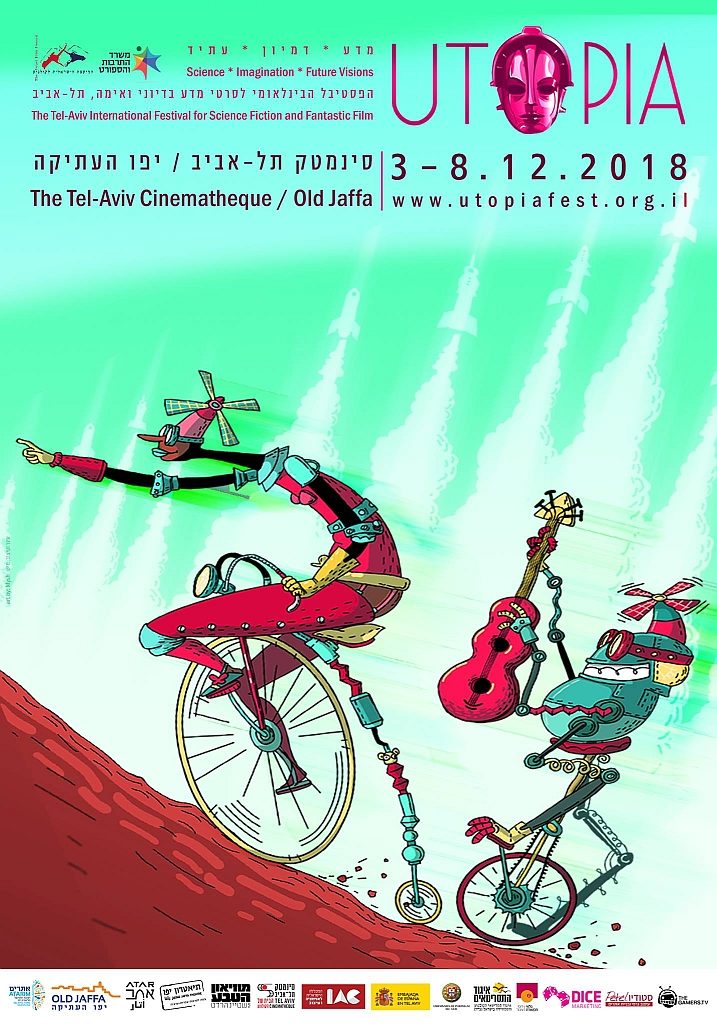
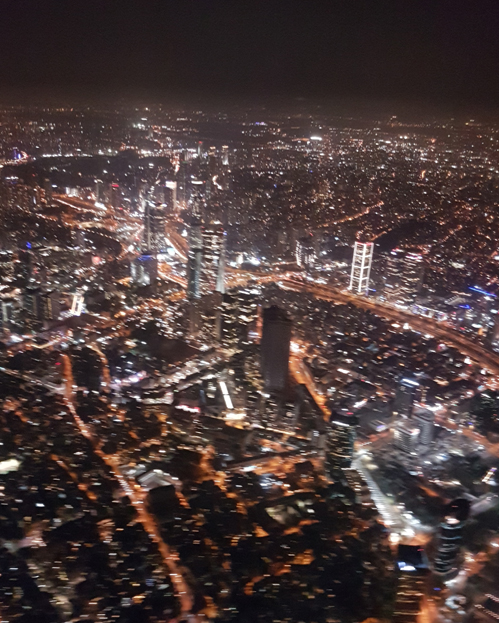


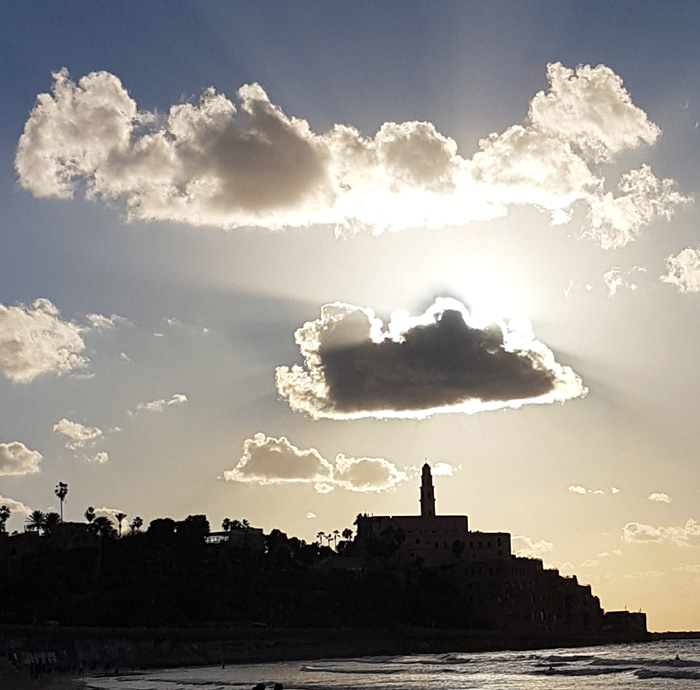


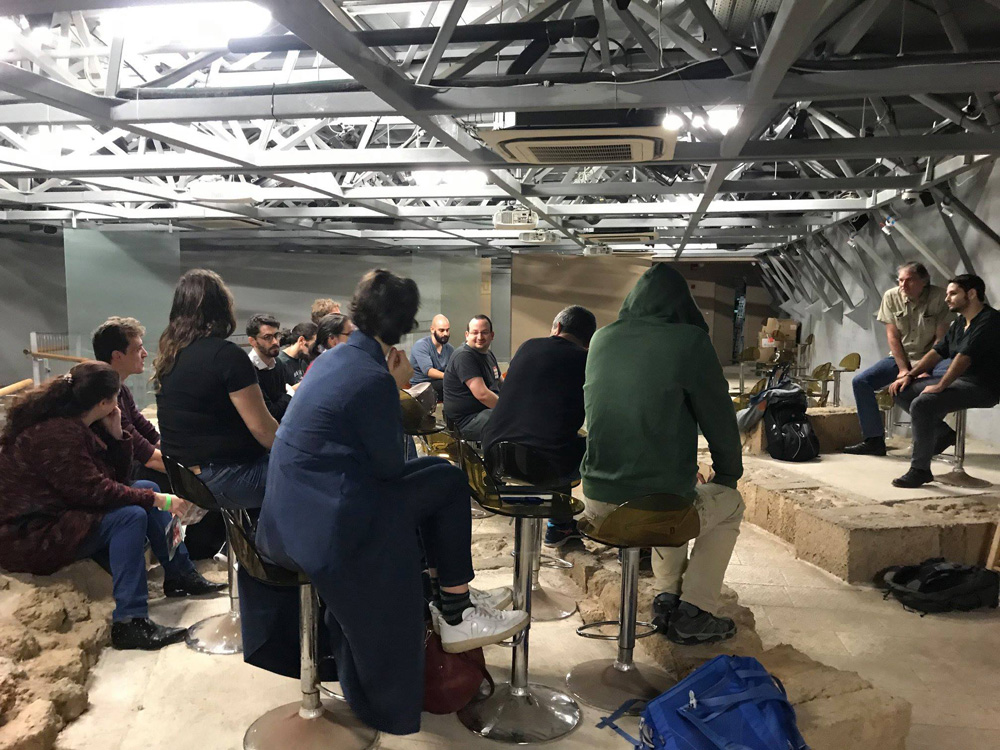


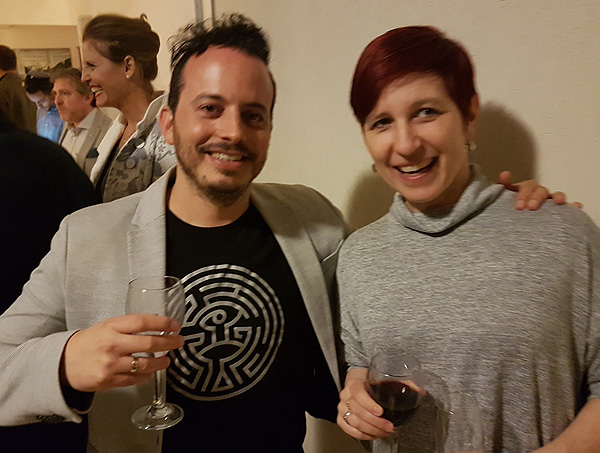

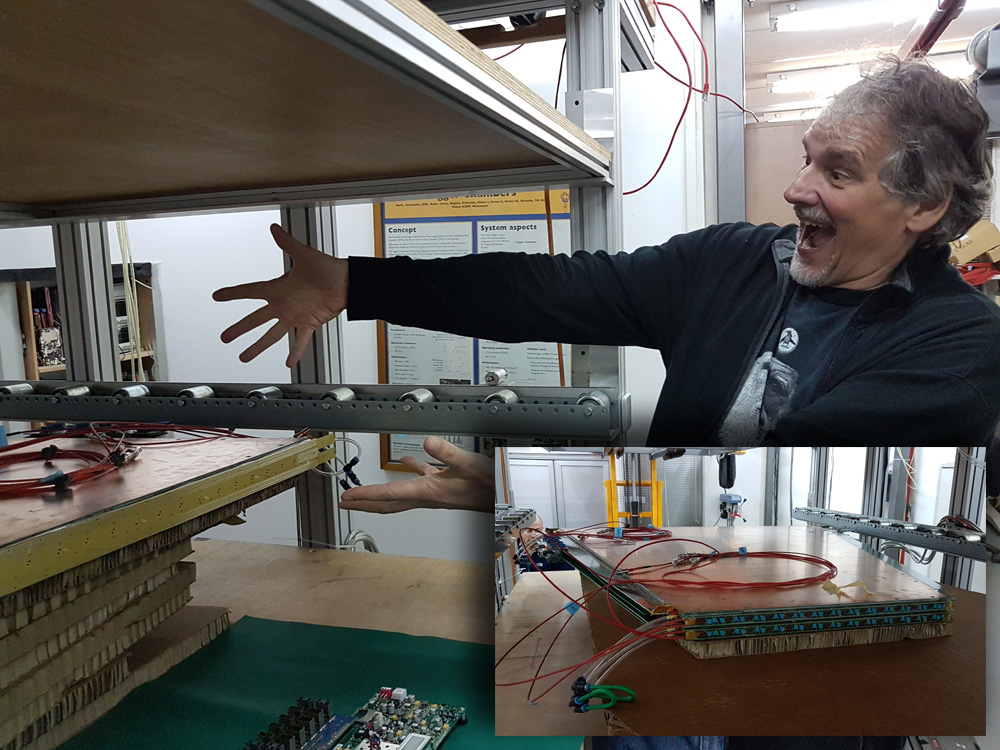
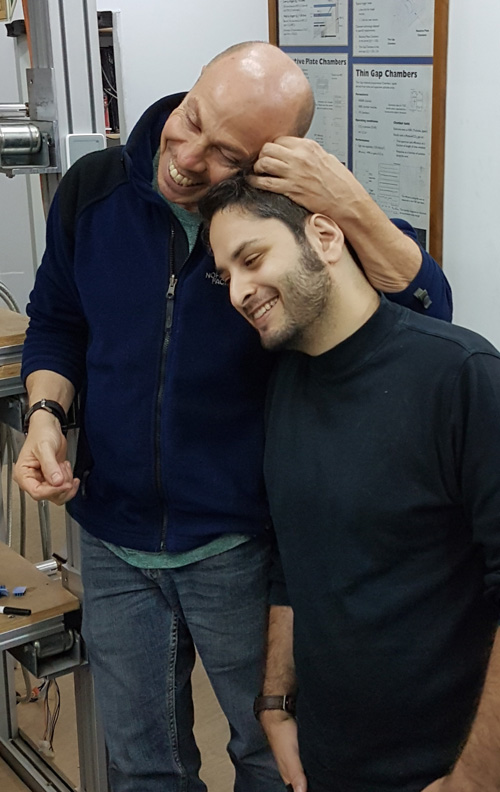

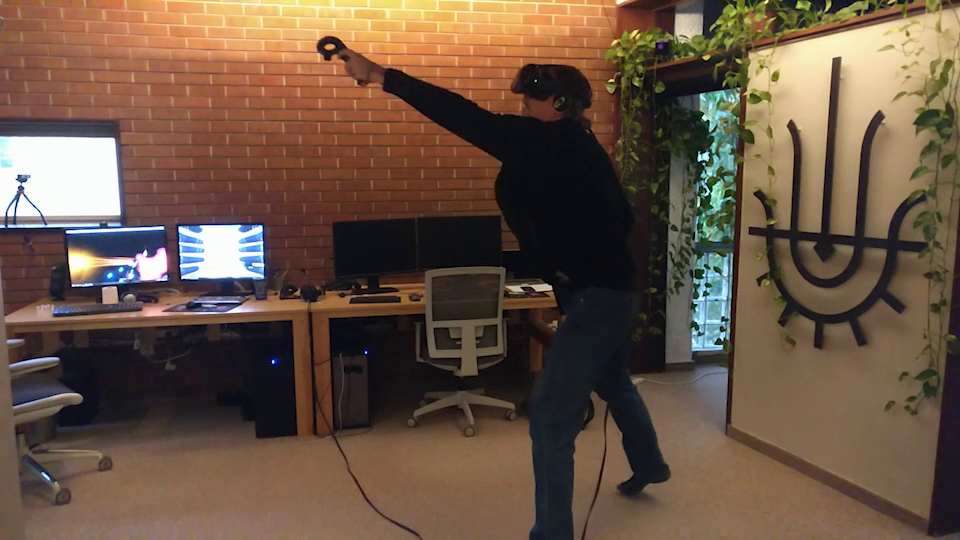
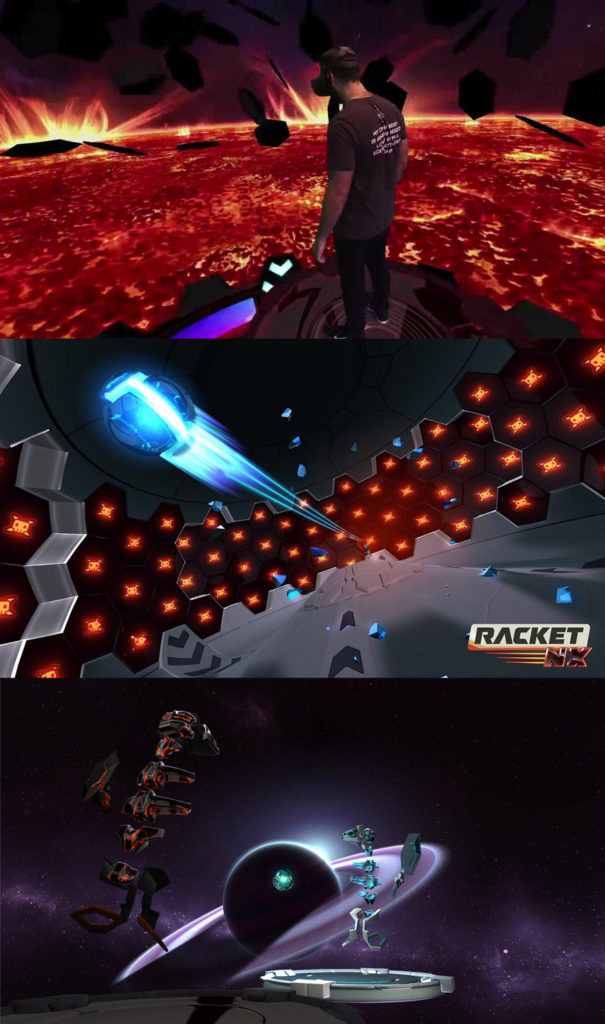

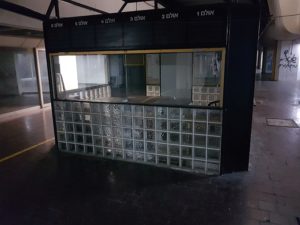




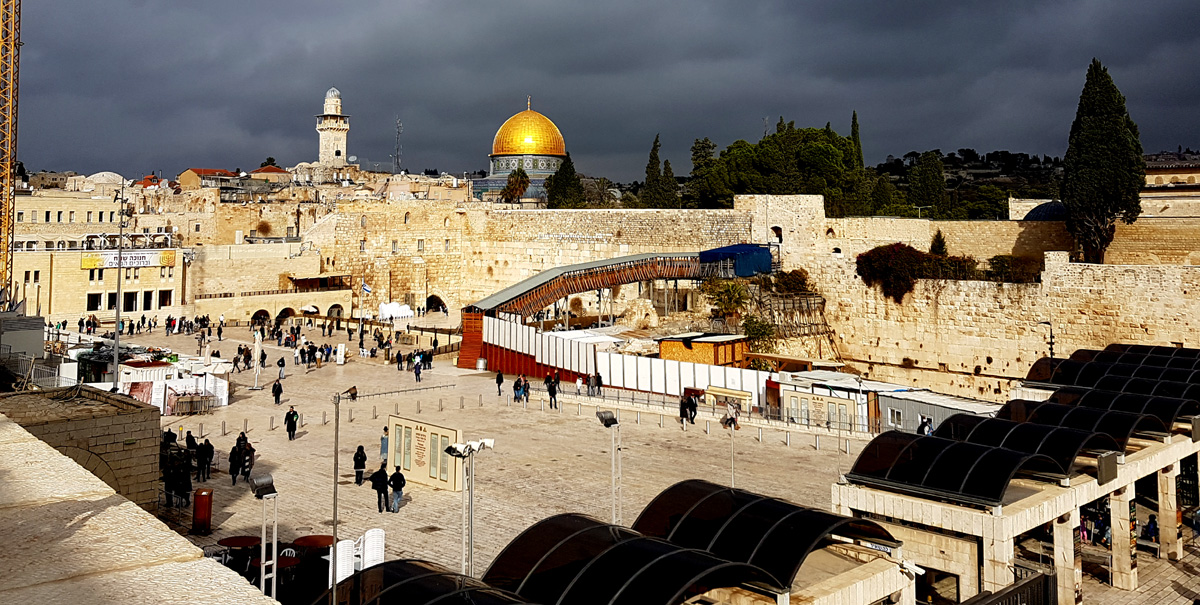
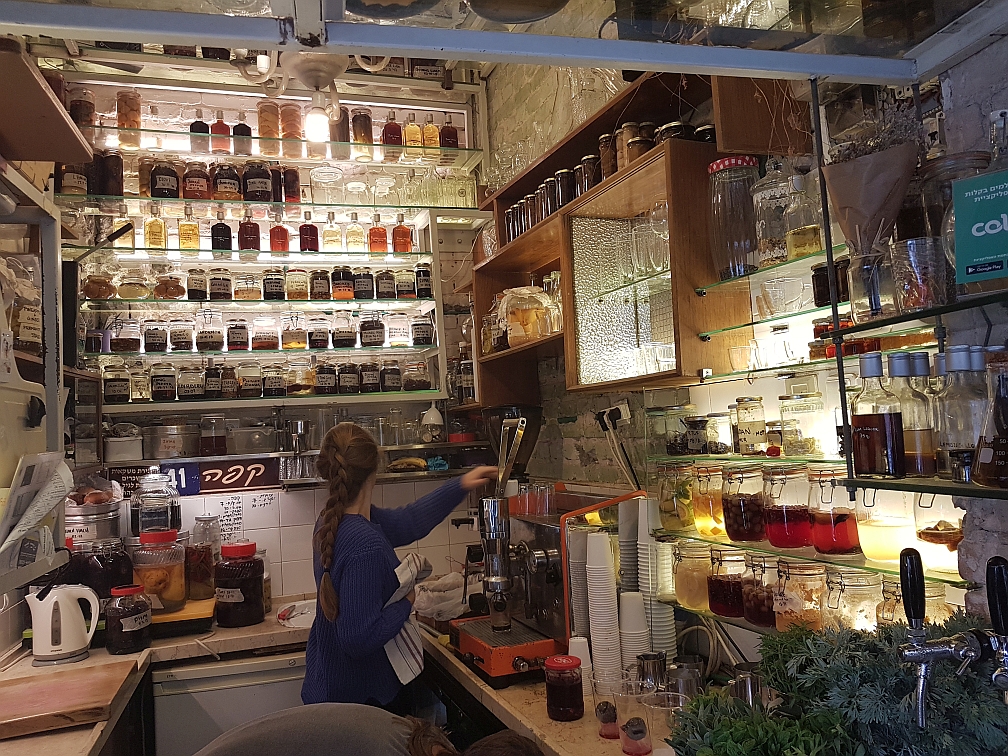








I have to say that christian guilt works both ways – as one of the jackasses responsible for your inbox problem (& lucky enough to receive a thoughtful reply from you, for which I am incredibly grateful) I ended up feeling guilty enough to buy a hardcover of Freeze Frame Revolution as a christmas gift for my sister.
That Adam person sound like lovely fella. Feels cruel that so often that kind of thoughtfulness can be born only from that kind of conflicts; even more cruel that it is only a fraction of their general outcome.
sz,
Wait, there’s a hardcover edition of FFR?
https://www.mag-sklep.pl/pl/p/POKLATKOWA-REWOLUCJA/813
I cant take a picture right now but you can check it on MAG website – ‘Oprawa – twarda’ (in EN that would be ‘Cover – hard’).
Kitties! Handsome.
Your friend Adam sounds like a cool guy. Takes balls to be liberal in Israel these days and he seems to know the score. His mother is clearly an amazing lady. Im curious as to his attitude to BDS seeing as he supports the boycott of the West Bank.
I’m not going to go over ground we’ve already covered, but a couple of points.
Abbas is not really someone to quote approvingly. He is seen, at best as a quisling by his own people and has administrated the bantustanisation of the West Bank for many years.
Disappointed to see you promoting one of the most insidious bits of propaganda around the Nakba. The idea that Arab broadcasts were a significant factor was debunked by Erskine Childers nearly 60 years ago, confirmed by many prominent Israeli Historians since.
https://en.wikipedia.org/wiki/Causes_of_the_1948_Palestinian_exodus#Criticisms_of_the_%22Arab_leaders'_endorsement_of_flight%22_explanation
Glad you enjoyed it anyway. Sounds like a good trip.
Oh no no, you were not supposed to enjoy yourself!! ;P
You could probably claim it as an expense if you set yourself up as a game reviewer, god knows that’s where the money seems to be nowadays.
Speaking of, I’d love to hear your take on The Last of Us, I know it’s not exactly a brand new game but I only got a chance to play it last week. The whole “Cordyceps infects humans” is right down your alley as a zombie apocalypse starting point. The game is suitably bleak and realistic (Well, if you squint at some points) and ends with a neat moral dilemma (Though they don’t insult you by giving you a choice, the game sticks to it’s narrative railroading unashamedly, Joel is very much his own character, even if you puppet him through most of the story)
I was most pleased that video gaming has finally discovered the advanced technology of the narrative ellipse (Seriously would it have killed Valve to even once fade to black to imply time has passed, poor Gordon Freeman literally never stopped for a breath once) and for an AAA game I think you’ll find it takes enough risks.
But uh, maybe finish those deadlines first 😉
Ooh, forgot to post this
https://www.youtube.com/watch?v=RjD1aLm4Thg
A lecture about non neural bioelectric communication in cells, couldn’t help thinking of The Things while watching it and how an intelligence based on this network would be very much like the creature as you described it.
Great read!
(And from my inner grammar douchbag: “It’s already on the high side of 120,00;” – wouldn’t want anyone unable to read the infographic below that line to think it was only 12,000, because that wouldn’t be cause for concern…)
Fascinating trip report, Peter…that sounds pretty amazing. That’s also a part of the world I’d love to visit but don’t see it as very likely; glad things worked out for you big time!
Aside: The smart gun report link in the footnote appears to be invalid (not a big deal other than the fact that I really wanted to read it.)
Can’t wait to hear about the VR set once you’ve got it! I finally sprung for a lower-end model back in the late summer/early fall (Oculus Go), but even at that level, they really have come a long way. Some of the visualizations are incredible, and it’s a sweet Netflix viewer to boot when you don’t want to bother people cranking up the big TV.
droid,
Hey droid,
If anyone should take responsibility for Peter reiterating that bit of Nakba narrative, it should be me. I gave it as an example in a long conversation we had. I wasn’t aware of its debunking – or at least, its diminished significance – in the overall historic happenings of the Nakba/War of Independence, and was mostly relying on testimonies from my grandparents, who had lived through those times. Of course, it makes sense that this would be the narrative promoted in Israeli discourse, and while I try to be critical of what I’ve been taught, some things I still take for granted. Mea culpa.
As for my thoughts on BDS: well – I honestly haven’t made up my mind.
I wholeheartedly support a boycott on products and services provided by the settlers in the West Bank – that, at least, is one thing I stand %100 behind that aligns with the BDS movement.
As for a boycott of all Israeli products, academic institutions and so on?
Ideologically, I agree with (at least some) BDS activists: the occupation must end. Some BDS activists would go on to say that Israel, as a country, must also be dismantled, and that would be one point on which we’d be divided, but that’s a whole other debate.
To me, the question is about whether the BDS movement is effective, and what it ultimately targets.
If its goal is to make people abroad feel like they’re doing *something* about the situation here, well – keep going.
If its goal is to create economic sanctions that Israel cannot ignore, thereby hoping to influence political discourse within the country – so far, at least, it’s been pretty unsuccessful. In fact, it’s had the opposite effect: right wing politicians use the BDS movement as a sort of boogeyman in their rhetoric, saying “see? the world hates us already, so we might as well stick to what we were doing because we’re going to be criticised *anyway.*”
It’s possible that the BDS movement will become big enough to be more than just a tool in political rhetoric. As for the israeli public – it makes them even more unwilling to listen to outside perspectives, because they are convinced they’re hostile and don’t have their best interest as jews and israelis in mind – “they’re boycotting us, aren’t they?” – and so left wing NGOs and movements are McCarthyistly labeled BDS collaborators and excluded from public discourse even more.
Some left wing activists here would say that that is all besides the point, that there is no reasoning with the Israeli public, and that the only solution will come through some external force playing the adult and forcing the Israeli government to see sense.
Maybe they’re right, and maybe I’m naive, but I don’t believe that. I think there are large parts of the israeli population that are reasonable and well intentioned, and that dialogue, rather than boycott, is the key to making them vote for a better future – but maybe I’m wrong.
Either way, I appreciate BDS activists. I think their heart is, at least, in the right place.
While I haven’t had much of a chance to read this post, the image captions remind me of an old FSTDT post:
http://www.fstdt.com/QuoteComment.aspx?QID=65687
…and what a certain “John” had written about it:
“Run, don’t walk, from that evil church before you catch teh gay! One minute you’ll be listening to a sermon on all the bad stuff that will happen to gays, pro-choicers, Democrats, Volvo drivers, Yankees (northerners, not the baseball team, although maybe them too, if God’s a Red Sox fan), illegal immigrants, people who drink latte, college graduates and people who thought their grandmother was a monkey, and next minute you’ll be struck by the gay rays emanating from her and you’ll be fantasizing about her tongue and losing all interest in men. Get out before it’s too late!!! ”
I have no idea why they reminded me of that post, but there you have it.
Montage!
“You know what’s wrong with Skyrim these days?”
“Yeah, but, John, if The Pirates of the Caribbean breaks down, the pirates don’t eat the tourists.”
And as long as you didn’t buy any expensive weapon systems, am guessing you still managed to boycott the correct people.
https://twitter.com/inthenow_tweet/status/1078673085010710533
“You could probably claim it as an expense if you set yourself up as a game reviewer, god knows that’s where the money seems to be nowadays.”
Not really. But you get free games. 😉
I’m afraid you’ll likely be disappointed in Skyrim VR – the game interface is precisely as terrible as it is on PC, but worse because you don’t have a keyboard to hit quick-switch buttons. Bethesda have literally not done the very least of effort to translate its control scheme for VR use; the quickbar isn’t even mapped to your hip, you have to *enter the menu to swap spells*. They just threw it out there and ran.
To actually recommend a VR game, you should try Jet Island. (Sometime later the coming year, when you’re no longer at risk of vertigo.) It’s not very long, but it highlights the power of VR by being a game that would be literally impossible on a monitor due to the way it exploits hand-aim to enable Spiderman-like movement. Also redirecting your flight at high speed with precisely aimed grapples is just an inherently joyful experience.
Separately, Elite: Dangerous is pretty much the reference game for VR spaceflight. They don’t do much to specifically enable VR gameplay, but all their cockpits are fully modelled and the lighting is gorgeous. (Though it’s strongly recommended to play that one with a HOTAS – you *really* want the fine movement control.) Plus, you know. Space!
Enjoy your VR.
I’m using your post about visiting Israel to tell you about YouTube throttling a video by David Sheen.
https://www.youtube.com/watch?v=B86lri_sJhw&bpctr=1546126102
David Sheen is an Israeli activists who criticizes Israel’s government & society. He gave a lecture in Amsterdam Dec. 12 this year. One video he posted of the lecture discussed the Chief Rabbi of the Israel Defense Force. This rabbi has endorsed Israeli soldiers raping ‘pretty women’ because war is hard.
Apparently pro-Israel viewers complained about this. YouTube has disabled the features on the video that allow people to embed it or copy it, even though the video contains the truth.
I agree that a boycott isn’t always productive, especially if it hampers dialogue with potential allies (like Adam). But the fact that their state department is lobbying to make boycotts outright illegal indicates that many anti-boycott groups are not behaving in good faith and that I will side with the right of others to boycott.
Also you should be more critical of whoever told you that anecdote about Palestinian complicity in attempted war crimes by Arab armies. That cannot cover the situation of the majority of the waves of Palestinian refugees, and it definitely cannot cover the situation of their children and grandchildren living in camps. And how long was the Six days war? In contrast, Settler expansion has been an ongoing process of land theft.
Hi Peter, I was really glad I could be there for at least the first of your events. wish I could be in all of them – but personal issues took over my free time.
I think you underestimate the number of fans you have in Israel. Your events have been badly advertised – perhaps “not advertised at all” would be a better way to put it – and I believe most of the people who would have been interested in attending were not even aware this was going on, as this festival isn’t really on the average israeli SF fan’s sights. The odd location of the first day’s events surely didn’t help (Tel avivians are notorious for refusing to travel to locations even a couple of kilometers beyond what they consider Tel Aviv proper).
As for Naqba: I hear a third-hand story (a friend’s father was was a young boy in 1948) about the British Army evicting an arab village “for their own safety” during the war. The houses stood empty until 1967. After the six-day war a delegation of refugees from that village, who were now inside the Isreli-occupied territories and therefore able to finally visit Israel, came to inspect the homes they left. Not long after, Israeli bulldozers flattened the village and removed all traces of it ever having existed. Make of it what you will.
[…] Peter Watts writes about a recent trip to Tel […]
Oh right. The Polish edition. Of course.
Loved it. In fact, any true fan would have already checked out the review I wrote on this very…
Oh, wait. I can’t seem to find it. I wrote a review of TLoU for Nowa Fantastyka way back in 2014, and I often port those over here after the exclusivity window has passed, but I don’t seem to be able to lay hands on it here. Anybody? Anybody out there remember me posting it?
If not, I’ll upload it over the next few days.
I’ll take your second point. Skeptical on the first, unless “his own people” includes all the people in his party who elected him and the PLO folks who did the same and ultimately, unless Wikipedia is lying, even Hamas (who originally wouldn’t touch him with a ten foot pole).
I mean, you may be right. I don’t know. But given all the people who’ve voted for him over the years, I have to consider the possibility that you’re falling into the No True Scotsman fallacy. Especially when you attribute words like “approvingly” to my link, which might be interpreted by some as an attempt to emotionally slant the dialog.
In any case, it doesn’t really matter; the people I met were, as far as I could tell, universally opposed to the same things you are. I think it’s a mistake to treat them as enemies when it’s possible to exert a more precise focus.
This looks cool. Will check it out.
Rrrrrrrr. Fixed.
I will keep an eye out— although I’m not a big fan of games with no offline mode.
Jesus. If that’s true, it’s pretty fucking disgusting.
Case In Point #27692856: why the world would be way better off if religion were treated as a mental illness.
And let’s not forget, Adam was far from unique in Tel Aviv, at least. His politics were typical of those folks we met (my understanding is they refer to Tel Aviv as “the bubble”).
No argument. Is it 20? 25? states in the US have apparently passed legislation to make such a boycott literally illegal. Victims of natural disasters have been told that getting gummint aid is contingent upon signing an affidavit attesting that they will not boycott Israel. All of this is fucking obscene.
Apparently West-bank settlement activity has really ramped up in the wake of Trump’s ascension, too.
For anyone interested in games, I recommend checking out “Hellblade: Senua’s Sacrifice”. I got some Echopraxia vibes playing it, and they recently released a VR version.
Unbelievable to know that “Blindsight” has among swarms of other things deep under its roots also “Starcontrol” 🙂
I’ve never been so involved into any other game, neither before, nor after. I remember sitting with an English dictionary and conspecting its dialogs into the notebook. Probably it was a factor that brought me ‘excellent” at the exam of English.
Later after reading Cohan and Stewart I even attempted to write an essay reconstructing the biological history of Ur-Quans 🙂
Have you ever played Starflight? It’s the game Star Control II was patterned after and has many of the same gameplay mechanics, minus the arcade-like starship battles. The graphics are hopelessly outdated and were never that good to begin with , but the plot, oh, the plot. A deep history spanning thousands of years, nasty and surprising plot twists, funny easter eggs, original aliens (they will seem familiar to Star Control fans but SF preceded SC by 6 years), and even some poetry.
The debt owed to Starflight 1& 2 is acknowledged by the developers of SCII and is even mentioned in its wikipedia article.
Anonymous,
Nevet heard of it before. In 1986, as I remember, we had no personal computer, only bookcase-sized vide-game automats in game-bars 🙂 Though I like its description at wiki. Maybe I’ll try.
Starflight and Starflight 2:Traders of the Cloud Nebula were bright spots in my eighties. I especially liked the fact that the war between the intelligent reptiles and the sapient plants had its roots in the fact that the Saurians regarded the genitals of the pants as a culinary delicacy.
Did you decipher the binary message from that Fesarius knockoff?